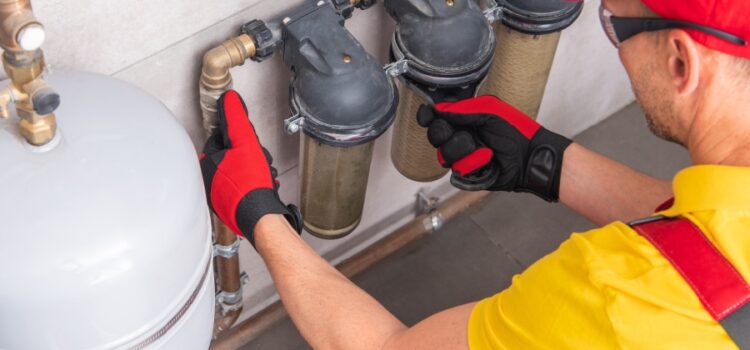Maintaining a functioning and efficient water softener system is essential for ensuring the longevity of your appliances, plumbing systems, and overall home comfort. We’ll walk you through some expert-recommended maintenance strategies specifically tailored to the unique conditions and challenges faced by homeowners in Austin.
Whether you’re new to water softeners or have been using them in your home for years, we’ll give you valuable insights and practical tips to help you keep your system in top shape. So, get ready to enhance the efficiency and effectiveness of your Austin water softener system installation with these tried-and-true maintenance practices!
Keeping Your Water Soft and Smooth
Maintaining a functioning and efficient water lining system is essential for ensuring the longevity of your appliances, plumbing systems, and overall home comfort.
As a homeowner in Austin, Texas, you may be dealing with hard water that contains high levels of minerals such as calcium and magnesium. Over time, these minerals can build up inside your pipes and appliances, leading to reduced efficiency and even damage. Regularly checking and cleaning your water softener’s resin tank is crucial to prevent mineral buildup from affecting its performance.
Another important maintenance tip is checking the salt level in your brine tank regularly. Salt acts as a regenerating agent for your water softener system by removing accumulated hardness minerals from the resin beads. Ensuring there’s always enough salt in the tank will help maintain optimal performance.
Proper care will not only protect your appliances but also improve the quality of water throughout your home, providing you with softer skin, cleaner dishes, and better-tasting drinking water.
Understanding Salt Types and Optimizing Recharge Cycles
To maintain a properly functioning water softener system, it’s crucial to understand the different types of salt available and how to optimize recharge cycles. There are three main types of salt used in water softeners: rock salt, solar salt, and evaporated salt.
Rock salt is the least expensive option but contains more impurities that can affect the performance of your system. Solar salt is obtained by evaporating seawater and typically comes in two forms: crystals or pellets. Evaporated salt is the purest form of sodium chloride and dissolves easily.
Choosing the right type of salt for your system depends on factors such as budget, water hardness levels, and personal preference. It’s recommended to consult with a professional before deciding which type of salt would be most suitable for your specific needs.
Optimizing recharge cycles involves programming your water softener system correctly to ensure efficient regeneration while minimizing waste. The frequency at which you should recharge your system depends on various factors such as household size, level of water usage, and hardness settings.
It’s important not to over-recharge or under-recharge your system as this can lead to unnecessary wear and tear or decreased efficiency respectively.
To find out what works best for you, consider monitoring both energy consumption and daily usage patterns over time while adjusting accordingly.
Regular maintenance tasks like cleaning brine tanks and resin beds should not be overlooked since they contribute significantly towards keeping your Austin water softener running smoothly.
Spotting Potential Issues and Avoiding Costly Repairs
Proactive prevention is crucial when it comes to maintaining your water softener system.
One important strategy in proactive prevention is regular inspection of your water softener system. This includes checking for any leaks or signs of wear and tear on pipes, fittings, valves, and other components. By catching these issues early on, you can address them before they escalate into more serious problems that require expensive repairs.
Another key aspect of proactive prevention is staying vigilant about the performance of your water softener system. Watch out for any changes in how effectively it softens your water or if there are any unusual tastes or odors coming from the treated water.
Addressing these issues promptly can not only prevent damage to appliances and plumbing but also ensure that you continue to enjoy all the benefits of having a properly functioning water softener system in Austin.
DIY or Call the Pros? Knowing When to Seek Expert Help for Your Water Softener
Maintaining a water softener system is crucial for the efficient functioning of your appliances and plumbing systems. While some routine maintenance tasks can be performed on your own, it’s important to know when it’s time to call in the professionals.
For minor issues such as cleaning salt bridges, adding salt pellets, or replacing filters, DIY maintenance can be an effective and cost-saving option. Learning how to test water hardness levels and adjust settings on your water softener can also be easily done with guidance from user manuals or online tutorials.
There are certain situations where seeking experts, especially in Water Softener Solutions, help is recommended. If you notice persistent problems like reduced water flow, excessive consumption of salt pellets, frequent regeneration cycles, or if your water softener stops working altogether despite troubleshooting efforts, it may be time to call in the pros.
They have the expertise and experience to diagnose complex issues and ensure proper repairing or replacement of faulty components.
An appropriate balance between DIY efforts and professional input will help keep your system running smoothly so you can enjoy all its benefits efficiently.
Reducing Water Waste and Cost with Proper Maintenance
Proper maintenance of your Austin water softener system is crucial for reducing water waste and increasing longevity. By taking the time to regularly maintain and inspect your system, you can ensure its longevity and efficiency. This will help avoid costly repairs or replacements and contribute to overall home comfort.
The expert-recommended strategies discussed are tailored to address the conditions and challenges faced by homeowners in Austin, TX. From checking salt levels to cleaning resin beds, these tips provide valuable insights into maintaining a functioning water softener system.
Whether you are new to water softeners or have been using them for years, implementing these maintenance practices will help you save on water expenses while preserving the quality of your appliances and plumbing systems.
